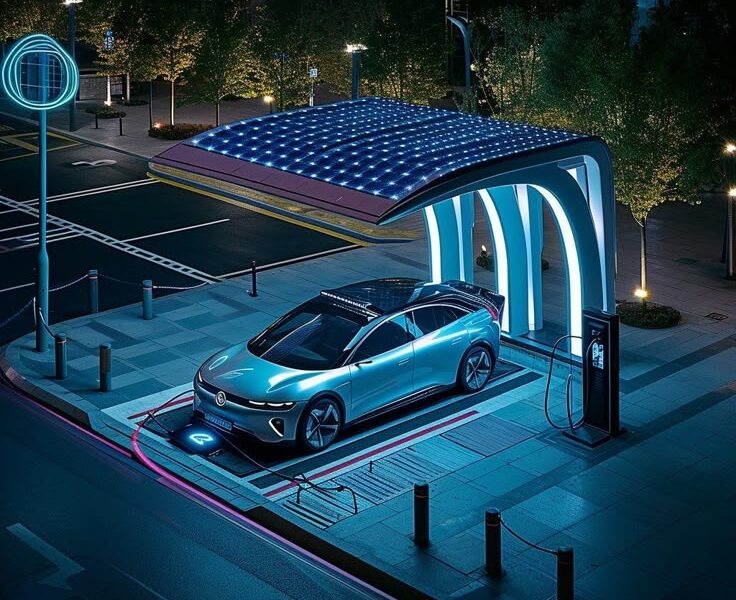🌱 Evolution of Environmental Awareness: Shifting Consumer Mindset
Evolution of Environmental Awareness: Shifting Consumer Mindset
The cultural shift towards electric vehicles truly reflects the evolution of environmental awareness, where fundamental changes are occurring in consumer mindset. Just a decade ago, the criteria for choosing vehicles used to be their speed, power, and beauty, but in today’s era, environmental impact and carbon footprint determination are playing a significant role in purchasing decisions. The modern consumer is thinking not only about their personal needs but also about collective environmental protection, which has made electric vehicles a symbol of sustainability. The increasing problems of air pollution in urban areas have drawn public attention towards clean transportation alternatives, where electric vehicles have become not only a source of personal transportation but also an expression of social responsibility. The younger generation is particularly more sensitive about environmental protection, influencing corporate policies through their purchasing power. Social media has created green consciousness among consumers by promoting environmental activism, where owning an electric vehicle is considered a symbol of social prestige. The inclusion of environmental sciences in educational institutions has made the new generation aware of the importance of protecting natural resources. International environmental agreements like the Paris Agreement have put pressure on both governments and the public to take measures for reducing carbon emissions. The continuous media coverage has presented the effects of climate change to the public, which has brought about a change in people’s thinking. Under Corporate Social Responsibility, companies are prioritizing electric vehicles to reduce their environmental impact. Government incentives and subsidies have made electric vehicles financially attractive. All these factors together are creating a cultural environment where the electric vehicle is not merely a means of transportation but has become a social statement and an expression of environmental responsibility.
◉ The Legacy of Traditional Engines: The End of a Century-Long Cultural Impact
Traditional petrol and diesel engines had deeply impacted not just the transportation sector but the entire human culture over the past century, and their demise indicates a major cultural shift. The internal combustion engine played a crucial role in shaping human societies since the industrial revolution, influencing not only urban planning but also economic structures, social relations, and cultural values. Petrol stations served not only as fuel supply centers but also as social meeting points where travelers and locals would interact. The sound and smell of the engine became an integral part of the vehicle experience, which is now fading. The culture of muscle cars and sports cars had turned vehicles into symbols of power and masculinity, while electric vehicles have challenged this notion. The culture of car modification, which involved engine tuning and work on exhaust systems, is now shifting towards electric conversions and software tuning. Enthusiast clubs and meetings for traditional vehicles are now transforming into electric vehicle enthusiast groups. Automotive journalism has changed its review standards, where attention is now given to range and charging times alongside 0-60 mph figures. The principles of car design are changing, where grilles have been replaced by smooth fronts. Driving schools have begun incorporating electric vehicle operation into their curriculum. Automotive museums have included exhibits on electric vehicle technology alongside historical internal combustion engines. All these changes reflect that we are entering a new era of automotive culture that spans a century.
◉ Global Cultural Movement: The International Narrative of Environmental Protection
The popularity of electric vehicles has indeed become part of a global cultural movement, where the international narrative of environmental protection has influenced various societies. Scandinavian countries have made sustainability a part of their national identity, where the use of electric vehicles is considered an expression of national pride. The European Union’s Green Deal has promoted the concept of clean transportation across the continent. The popularity of electric pickup trucks in North America has served as a bridge between traditional automotive culture and modern environmental awareness. Rapid urbanization in Asian countries has compelled citizens to adopt electric vehicles as a solution to air pollution. Off-grid solar charging solutions in African countries have made electric vehicles a symbol of energy independence. Oil-rich Middle Eastern countries are adopting electric vehicles as part of economic diversification. Biodiversity conservation in Latin America has promoted the use of electric vehicles. International environmental organizations have declared electric vehicles an important means for climate change mitigation. Global media has given positive coverage to electric vehicle adoption. Electric vehicles are being presented as the sustainable future of transportation at international conferences and summits. This global cultural movement is turning electric vehicles into a symbol of a global purpose, beyond just a product.
◉ Transformation of Business Culture: The New Face of Corporate Responsibility
The emergence of electric vehicles in the business world has created fundamental changes in corporate culture, where the concept of corporate responsibility is being reshaped. Automotive manufacturers have centered their brand identities around environmental stewardship, with electric vehicles becoming manifestations of their sustainability commitments. The electric transition of corporate fleets has helped businesses reduce their environmental impact. Sustainability standards in supply chain management have imposed environmental compliance on suppliers manufacturing electric vehicle components. Employee transportation programs have prioritized electric vehicles. Corporate headquarters have installed workplace charging infrastructure. Environmental performance reports in shareholder meetings have made electric vehicle adoption a key performance indicator. Corporate social responsibility initiatives have launched community electric vehicle awareness programs. Electric vehicle displays at business conferences and corporate events have demonstrated industry leadership. Corporate partnerships have collaborated on the development of electric vehicle charging infrastructure. Employee incentive programs have encouraged electric vehicle purchases. All these changes indicate a major shift in business culture, where planetary health has become as important as profitability.
◉ Evolution of Urban Culture: Revolutionary Changes in Urban Planning
The proliferation of electric vehicles has radically transformed urban culture and planning concepts, where cities are adapting to the new demands of electric mobility. Urban planners have altered street designs for a better balance between pedestrians, cyclists, and electric vehicles. Public parking spaces have preferentially included electric vehicle charging stations. Urban zoning regulations have made electric vehicle charging infrastructure mandatory for commercial properties. Public transportation systems have incorporated electric buses and trains. City planning departments have established electric vehicle adoption targets. The electric transition of municipal fleets has demonstrated the commitment of city administrations. Smart city initiatives have integrated electric vehicles into urban ecosystems. Urban air quality monitoring has quantified the benefits of electric vehicles. Public awareness campaigns have educated citizens about electric vehicle adoption. City branding has made clean transportation a part of urban identity. All these changes are heralding a new era of urban culture, where cities are becoming models of sustainable living, not just places of residence.
◉ New Means of Cultural Expression: The Reflection of Electric Vehicles in Art and Entertainment
Electric vehicles have generated new means of cultural expression, where art, entertainment, and media have presented this technological change in their own ways. In films and television shows, electric vehicles are being featured with futuristic and environmentally conscious characters. Automotive photography has artistically captured the clean lines and minimalist designs of electric vehicles. Music videos are showcasing electric vehicles as symbols of modern lifestyle. Video games have included electric vehicles in futuristic settings. Art installations have used electric vehicle components as recycled art. Literature is presenting electric vehicles as metaphors for a sustainable future. The fashion industry has incorporated electric vehicle themes into clothing designs. Architecture has integrated electric vehicle charging stations with aesthetic designs. Performing arts have included electric vehicles with environmental themes. Digital art has presented electric vehicle technology in virtual environments. All these cultural expressions are turning electric vehicles into a cultural symbol, beyond just a transportation device.
◉ The Influence of Digital Culture: The Convergence of Technology and Sustainability
The popularity of electric vehicles reflects the profound influences of digital culture, where the convergence of technology and sustainability is emerging as a new cultural force. Social media influencers have promoted the electric vehicle lifestyle. Mobile apps have transformed the electric vehicle ownership experience. Online communities have enabled knowledge sharing among electric vehicle owners. Digital platforms have made electric vehicle data analytics accessible. E-commerce has established online markets for electric vehicle accessories. Streaming services have popularized electric vehicle-related content. Gaming platforms have included electric vehicle simulations. Virtual reality has made electric vehicle test drives possible digitally. Artificial intelligence has taken electric vehicle personalization to new levels. Blockchain technology has made electric vehicle energy trading possible. These digital cultural changes are making electric vehicles the best blend of modern technological progress and environmental protection.
◉ Transformation of Social Attitudes: New Standards of Social Prestige
The use of electric vehicles has produced significant changes in social attitudes and standards of prestige, where environmental awareness has become a new measure of social respect. Electric vehicle ownership is receiving positive attention at social gatherings. A sense of camaraderie is developing among electric vehicle owners in neighborhood communities. Environmental considerations are influencing vehicle purchase decisions in family discussions. Educational institutions are presenting electric vehicles as practical applications of science and environmental studies. Religious organizations have promoted environmental stewardship as an ethical responsibility. Electric vehicle showcases at community events have increased public awareness. Social norms have encouraged conscious consumption instead of conspicuous consumption. Peer influence has gained social acceptance for electric vehicle adoption. Generational differences have made electric vehicle preference prominent among young adults. Social media validation has made electric vehicle ownership a desirable lifestyle choice. These changes in social attitudes indicate that we are moving towards a society where ethical values, alongside material possessions, determine social prestige.
◉ Educational Transformation: The Inclusion of Environmental Education in Training the New Generation
The concept of electric vehicles in educational institutions has brought significant changes to curricula and teaching methods, where the new generation is being prepared for a sustainable future. Science curricula have included electric vehicle technology as a practical example. Engineering programs have offered specialized courses on electric vehicle design and development. Business schools have begun teaching business models for sustainable transportation. Environmental studies have used electric vehicles as case studies. Vocational training institutes have started courses on electric vehicle maintenance and repair. School projects have popularized electric vehicle-related topics. University research has conducted studies on various aspects of electric vehicle technology. Student competitions have included electric vehicle design challenges. Educational field trips have made electric vehicle manufacturing plants into destinations. Teacher training programs have incorporated electric vehicle concepts into instructional materials. These educational changes are preparing the new generation with a mindset that can balance technical innovation and environmental responsibility.
◉ Future Cultural Landscapes: The Formation of a New Global Culture
The cultural impact of electric vehicles will cause a reformation of global culture in the coming years, where the blend of sustainability and technology will give birth to new cultural values. The concept of global citizenship, which will include environmental responsibility, will be promoted through electric vehicles. Electric vehicles will be included in cultural festivals and events as symbols of environmental awareness. Electric vehicle technology will become part of shared cultural heritage in international cultural exchanges. In the preservation of cultural heritage, electric vehicles have presented a model of coexistence with traditional transportation methods. Global cultural policies have made sustainable transportation a part of cultural development. Electric vehicles have opened new avenues for international cooperation in cultural diplomacy. Cultural tourism has created a niche market for electric vehicle adventures. Cultural innovations have merged electric vehicle designs with local artistic traditions. Cultural identity has made electric vehicle adoption a means of modern cultural expression. As a cultural legacy, the electric vehicle revolution will become a symbol of our era’s cultural achievement for future generations. All these cultural changes are forming a global culture where technological progress and environmental protection will not be contradictory but complementary to each other.


